Bakula – Mimusops elengi: Benefits, Remedies, Research, Side Effects
Bakula- Mimusops elengi is an Ayurvdic plant useful in the treatment of headache, toothache, diseases of the oral cavity, poisonous cases, diarrhea and more.
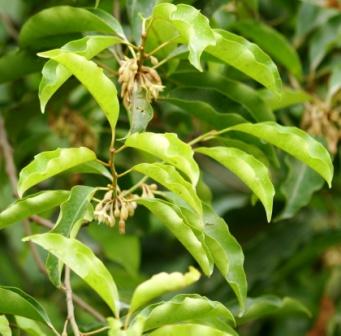
Latin name- Mimusops elengi Linn.
Family- Sapotaceae (Madhuka Kula)
Table of Contents
Vernacular names
Names in different languages:
Hindi name – Moulasiri
English name – Spanish cherry, Medlar, Bullet wood
Kannada name – Bakulada hoovugalu
Bengali name – Bakul
Gujarathi name – Bolasari
Marathi name – Elaingi
Tamil name – Bagulam
Telugu name – Pogada chettu
Sanskrit Synonyms
Chira puspa- The flowers remain fresh for a long duration
Madhugandha- The flowers have pleasant smell
Sthreemukha, Sthirakusuma, Sthirapushpa- The fragrance of the flower is retained even after it is dried
Seedhugandha, Madyadohada, Madyagandha- The smell of flower is intoxicating like alcohol
Sheershakesara, Kesara, Simha kesari- The flower is dense like mane of lion
Visharada, Shimbisimha, Gudhapushpa, Krishna Twagankura,
Shiva – Auspicious
Drakshaphala – Fruits resembles grape
Classical categorization
Classical categorization of Bakula:
Bhavaprakasha- Pushpa varga – flower bearing group of herbs
Dhanvantari Nighantu- Amradi varga
Kaiyyadeva Nighantu- Oushadhi varga
Raja Nighantu- Karaveeradi varga
Shodala Nighantu- Amradi varga
Scientific classification
Kingdom: Plantae
Order: Ericales
Family: Sapotaceae
Genus: Mimusops
Species: M. elengi
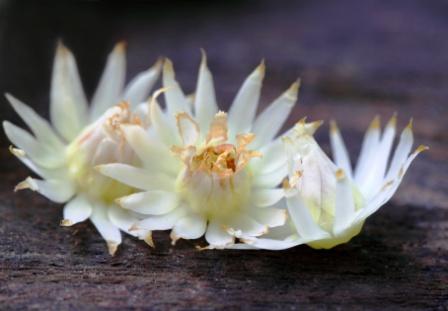
Uses
Medicinal uses of Bakul – Bullet wood:
- The powder of the dried flowers or the juice of fresh flowers of Bakula is administered through the nostrils (Nasya karma) to get relief from headache and sinusitis.
- The decoction prepared from the bark of the tree of Mimusops elengi is used for gargling to treat diseases of the oral cavity like gingivitis, looseness of teeth, oral ulcers etc.
- The tender leaves of Bakula or the unripe fruit of the plant is chewed to treat bleeding from the gums and gingivitis.
- The cold infusion or decoction prepared from the bark of the stem is given in a dose of 40-50 ml to treat diarrhea and intestinal worms.
- The cold infusion of the bark of Mimusops elengi is given in a dose of 40-50 ml to treat dysmenorrhea and leucorrhea.
- The bark decoction is given in a dose of 30-40 ml to treat fever and general debility.
- In case of insect bites and other small animal bites, the paste of the bark and unripe fruit is applied over the local area to relieve the effect of poison.
- The cold infusion prepared from the dried flowers of the plant is given regularly in a dose of 40-50 ml to strengthen the cardiac muscles and is beneficial in persons suffering from weak cardiac muscles.
- The cold infusion or decoction of the flowers of Mimusops elengi acts like a general tonic.
- Leaves are explained as anti-toxic and used in poisonous conditions by Master Sushruta. Its leaves are used as nasal drops for treatment.
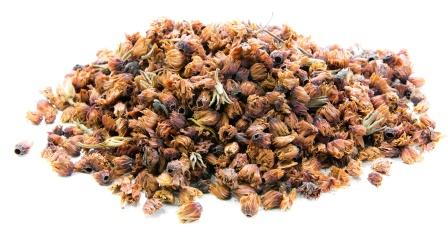
Morphology
Mimusops elengi is a medium-sized evergreen tree found in tropical forests in South Asia, Southeast Asia and northern Australia.
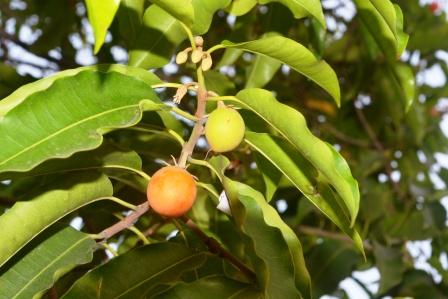
Spanish cherry is a large tree growing to a height of 12- 15 m and is found all over India. The central wood of the tree is hard with reddish color. The flowers are pale yellow or white with a pleasant smell. The fruit is found with 1-2 shining seeds within.
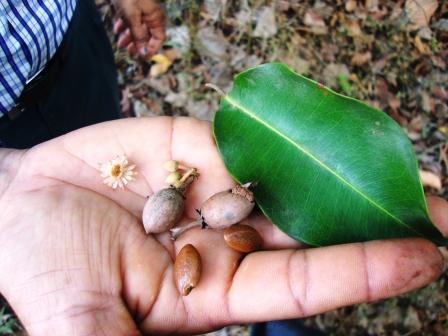
Properties, part used, dosage
Mimusops elengi medicinal properties:
Rasa (Taste) – Katu (Pungent), Kashaya (Astringent)
Guna (Qualities) – Guru (Heavy)
Vipaka – Katu (Undergoes Pungent taste after digestion)
Veerya (Potency) – Sheeta (Cold)
Karma (Actions) – Pittakapha shamaka (reduces vitiated Pitta and kapha dosha)
Part used- Bark, Flower and Fruit
Dosage:
Decoction of bark- 50 to 60 ml
Powder of flower- 1 to 2 g
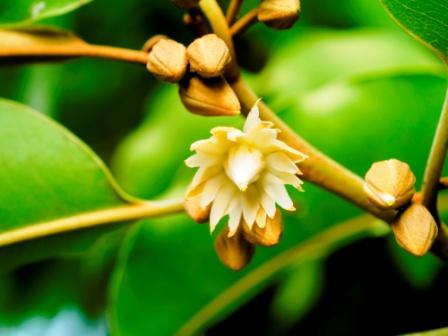
Chemical constituents
Mimusops elengi chemical constituents:
The leaves of the plant Bakula contain sterols, tannins and reducing sugars. The flower contains D-Mannitol, beta sitosterol and D- glycoside. The seed containspentacyclic triterpene acids and mimusopic acid. The stem bark of the tree contains spinasterol and taraxerol.
Sanskrit verse
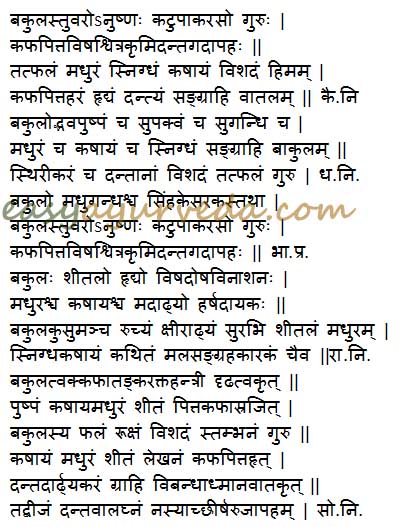
Uses, Indications
Bakula uses as per Traditional Ayurveda:
Indicated in –
Visha – Toxic conditions, poisoning
Shvitra – leucoderma, vitiligo
Krumi – worm infestation
Dantaroga – tooth decay
Bullet wood fruit –
Madhura – sweet
Snigdha – unctuous, oily
kashaya – astringent,
Vishada – clarity, non slimy
Hima – coolant
kaphapittahara – Balances Kapha and Pitta Dosha
Hrudya – acts as cardiac tonic, congenial for heart
Dantya – good for teeth
Sangrahi – absorbent, useful in diarrhea, IBS
Vatala – increases Vata Dosha
Guru – heavy to digest
Bakul seeds:
Powder nasya is useful in the treatment fo shiroroga – headachne and other disorders of the head.
Adverse effects
Adverse effect of Bakula: No adverse effect is seen after the normal use of the herb Bakula. However prolonged exposure or intake of its flowers may cause mild intoxicating effect in some individuals.
Interaction with medicines, supplements
Can this be used while taking Homeopathic medicine?
Yes. This product does not react with homeopathic medicine.
Can this medicine be continued while taking supplements like multivitamin tablets, Omega 3 fatty acids etc?
Yes. Generally, this product goes well with most dietary supplements. However, if you are taking more than one product per day, please consult your doctor for an opinion.
With western
medicines
Seek your
doctor’s advice if you are taking this product along with other western
(allopathic / modern) medicines. Some Ayurvedic herbs can interact with modern
medicine.
If both Ayurvedic and allopathic medicines are advised together, then it is
best to take Allopathic medicine first, wait for 30 minutes and then take the
Ayurvedic medicine.
Ayurvedic medicines
Ayurvedic medicines containing Bakula:
Baladhatryadi taila: It is an Ayurvedic oil, used in Ayurvedic treatment of headache, eye disorders, burning sensation in eyes, head, gout arthritis. It is used for external application and oral intake.
Varishoshana rasa: It is an Ayurvedic medicine in tablet or powder form. It is used in the treatment of splenomegaly, anemia, abdominal colic etc.
Geecare powder: It is a proprietary Ayurvedic medicine used for complete oral cavity protection.
Research
Research articles about Mimusops elengi:
Anti- bacterial action: The extracts of Mimusops elengi L. (family: Sapotaceae) bark, fruit and seed were evaluated for antibacterial activity by using spectrophotomertic method against gram positive and gram negative strains viz. Nocardia asteroides NRRL 174, Micrococcus luteus ATCC 10240, Bacillus subtilis PCSIRB 248, Bacillus licheniformis NCL 2024, Proteus mirabilis ATCC 29425 and Salmonella typhimurium ATCC 14028. The fruit and seed extracts were found inactive, while stem bark extracts showed antibacterial activity against all 6 bacterium.
Anti- anxiety action: The present study evaluates the anti-anxiety activity of methanolic, aqueous and n-butanol extract of bark of Mimusops elengi using elevated plus maze in swiss albino mice. Methanol extract at 50,100 and 200 mg/kg, aqueous extract at 100 and 200 while n-butanol extract at 200 mg/kg in mice were active but methanolic extract at 200 mg/kg was found to have more significant anxiolytic activity as compared to aqueous and n-butanol extract.
Anti- diabetic activity: The effect of the bark of the bark of the tree showed significant anti- ulcer action in the gastrointestinal area.
Anti- urolithiatic and anti- oxidant action: Petroleum ether, chloroform, and alcohol extracts of Mimusops elengi bark were evaluated for antiurolithiatic and antioxidant activity in male albino Wistar rats. All the extracts of M. elengi were safe orally and exhibited no gross behavioral changes in the rats. In hypercalculi animals, the oxalate, calcium, and phosphate excretion grossly increased. However, the increased deposition of stone forming constituents in the kidneys of calculogenic rats were significantly (P < 0.001) lowered by curative and preventive treatment with alcohol extract (AlE) of M. elengi. It was also observed that alcoholic extract of M. elengi produced a significant (P < 0.001) decrease in MDA, and increased GSH, SOD, and CAT. These results confirm that AlE of M. elengi possesses potent antiurolithiatic activity.
Author: Dr.B.K.Prashanth M.D (Ayu), Ph.D
E mail: drprashanthbk@gmail.com
Sthanika Karma (Systemic Action)
External Application – It has Antimicrobial, styptic action. Indicated in Headaches, Nerve Weakness and related disorders. Bark decoction can be used for gargling in case of mouth related diseases like is toothache, inflammation in the dental cavity etc. Bark powder can be used as tooth powder. Unripe fruit can be chewed in these conditions which helps to prevent bleeding of gum.
Internal administration-
Digestive System – Being Astringent in taste it acts as an absorbent. Indicated diarrhea. In Worm infestation its bark juice can be administered.
Circulatory System – Flower is Hridya (good for heart ), Bark and Fruit has styptic action. Indicated in Menorrhagia, Leucorrhea, etc.
Excretory System – Indicated in inflammatory conditions of bladder and ureter.
Reproductive system – Indicated in Yoni srava (Leucorrhea, Menorrhagia etc.), Weakness of uterus
Satmikarana –Its bark has Anti poisonous effect, and its fruit is indicated in general debility.
Tapakrama – Indicated in fever











3 comments on “Bakula – Mimusops elengi: Benefits, Remedies, Research, Side Effects”
Shenika Keis
yeah it is Good for diabetes patient. Thanks for sharing it.
SHEKHAR
great info about madhugandha. can you please tell the benifits of its leaves dicaction .
Dr J V Hebbar MD(Ayu)
Leaves are explained as anti toxic and used in poisonous conditions by Master Sushruta. Its leaves are used as nasal drops for treatment.